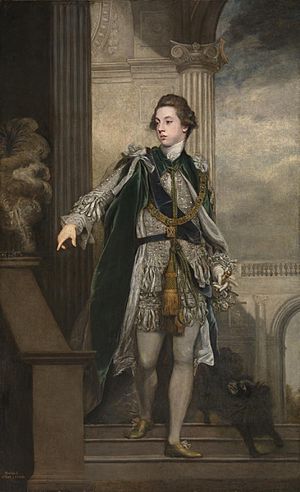Carlisle Peace Commission facts for kids

The Carlisle Peace Commission was a group of British peacekeepers sent to North America in 1778. Their goal was to talk with the rebellious American leaders during the American Revolutionary War. They offered the Americans a chance to rule themselves, even having a say in the British Parliament. However, the American leaders, known as the Continental Congress, knew that British troops were leaving Philadelphia. So, they demanded full independence, which the commission was not allowed to give.
This peace commission was important because it was the first time the British government officially agreed to talk with the Continental Congress. Before this, in 1776, there was an informal meeting called the Staten Island Peace Conference, but it didn't work out.
Why Did Britain Send the Commission?
The first time Britain tried to talk with the American colonies after the war started in 1775 was in September 1776. A group from the Second Continental Congress met with Admiral Lord Richard Howe. He had limited power to negotiate with individual colonies. This meeting failed because the Americans had just declared independence, which Howe couldn't accept. Also, the American negotiators didn't have much power to make deals.
After the British lost an important battle at Saratoga in October 1777, they worried that France would officially support American independence. So, the British Prime Minister, Lord North, asked Parliament to remove some unfair laws, like the Tea Act. He then sent the Carlisle Peace Commission to try and make a deal with the Continental Congress.
The commission was allowed to offer a type of self-rule, similar to what British Dominions would later have. This was a big change because before, Britain only wanted to talk with individual states, not the Continental Congress as a whole group. Some historians believe the war might have been avoided if these terms were offered earlier. However, King George III likely wouldn't have agreed to such an offer back then.
Who Was on the Commission?
William Eden helped set up and was part of the commission. But the main leader was the Earl of Carlisle. Other members included George Johnstone, who used to be a governor. One famous person, Walpole, joked that Carlisle was "very fit to make a treaty that will not be made" because he was young and didn't know much about business. Another person, Richard Jackson, refused to join when he found out that the United States and France had signed a Treaty of Alliance. The commissioners actually learned about this alliance before they even left Britain in April.
One important thing the commissioners didn't know before they left was that General Sir Henry Clinton had been ordered to leave Philadelphia. This order was given a month before they sailed. Carlisle believed the British government hid this information on purpose, thinking they might not have gone if they knew. Carlisle wrote to his wife, "I don't see what we have to do here." When he found out about the planned withdrawal, Carlisle asked Clinton to delay it, but Clinton said he had to follow his orders right away. This made Carlisle feel like the commission was meant to be "a mixture of ridicule, nullity, and embarrassments." Eden was also upset about not being told, as the British plan to leave made the Americans even more determined.
On June 13, the commissioners sent their ideas to Congress, which was meeting in York, Pennsylvania. Congress replied by saying they wanted American independence to be recognized, or for all British forces to leave the states first. The commission was not allowed to agree to these terms. The commission tried to get the public on their side by warning of destruction, but it didn't work. Johnstone even tried to bribe some members of Congress. The Marquis de Lafayette challenged Carlisle to a duel because of some anti-French comments Carlisle made.
Thomas Paine spoke out against the British offers. Gouverneur Morris also wrote several articles against them. The commissioners shared a public statement, which was printed in the Hartford Courant on October 10, 1778. The Marquess of Rockingham, who was against the war, didn't like the threats in the statement and tried to get it officially rejected.
What Happened After the Commission Failed?
Johnstone sailed back to Britain in August, and the other commissioners returned in November 1778. Since the British couldn't get General George Washington's Continental Army into a big fight, they changed their war plan. They focused on a Southern Strategy to try and win the war in North America. Another attempt to make peace in December 1780, called the Clinton-Arbuthnot peace commission, also failed. There were no more serious peace talks until the Americans won a big victory at Yorktown in 1781.
The failure of this peace effort was one reason why Benedict Arnold decided to switch sides and join the British during the American Revolution. He was also upset about not getting promoted and not receiving money he was promised from the British to capture West Point.
 | Frances Mary Albrier |
 | Whitney Young |
 | Muhammad Ali |

